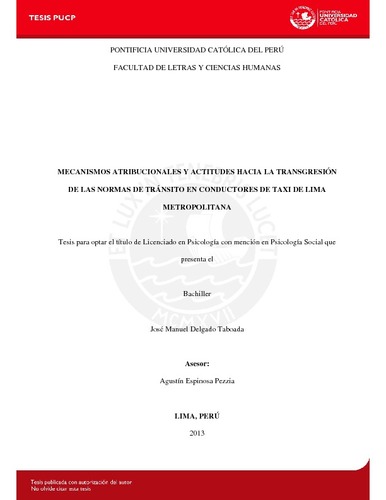| dc.contributor.advisor | Espinosa Pezzia, Agustín | es_ES |
| dc.contributor.author | Delgado Taboada, José Manuel | es_ES |
| dc.date.accessioned | 2014-02-12T20:53:45Z | es_ES |
| dc.date.available | 2014-02-12T20:53:45Z | es_ES |
| dc.date.created | 2013 | es_ES |
| dc.date.issued | 2014-02-12 | es_ES |
| dc.identifier.uri | http://hdl.handle.net/20.500.12404/5101 | |
| dc.description.abstract | La presente investigación tiene como objetivo explorar el vasto tema de la transgresión de las
normas de tránsito en Lima Metropolitana desde losconstructos de la atribución y actitudes,
utilizando una metodología cualitativa, a partir de la percepción de agentes clave involucrados
en el engranaje social del tránsito limeño: los taxistas. Para este fin, se realizaron 40
entrevistassemi-estructuradas a taxistas limeños en su propio escenario de trabajo. Se encontró
que los conductores de taxi más jóvenes, que trabajan más horas, que alquilan los carros, que
tienen menos estudios son más propensos a reconocer comportamientos transgresores de las
normas de tránsito, elaborando atribuciones de autobeneficio y actitudes justificatorias,
mientras que suelen elaborar atribuciones negativas y actitudes descalificatorias frente al
comportamiento transgresor de otros infractores. Estos resultados nos sugieren hipótesis de
trabajo para investigaciones futuras cuantitativas y mixtas en este tema.
Palabras clave: Mecanismos atribucionales, actitudes, transgresión de las normas,
tránsito, taxistas, Lima Metropolitana. | es_ES |
| dc.description.abstract | Abstract
This research aims to explore the vast subject of the violation of traffic rules in
Metropolitan Lima from the constructs of attribution and attitudes, using a qualitative
methodology, based on the perception of key actors involved in the social machinery traffic
Lima: taxi drivers. To this end, 40 semi-structured interviews were conducted with taxi drivers
from Lima in their own work setting. It was found that younger taxi drivers, who work longer
hours, rent the cars, are less educated are more likely to recognize their personal traffic rules
violation behaviors, developing self-benefiting attributions and justificatory attitudes while
often developing disqualifying negative attributions and attitudes against the behavior of other
4
traffic rule offenders. These results suggest a working hypothesis for future quantitative and
quanti-cualitative researches on this issue.
Key words: Attributional mechanisms, attitudes, traffic’s norm deviation,
Metropolitan Lima, taxi drivers. | es_ES |
| dc.language.iso | spa | es_ES |
| dc.publisher | Pontificia Universidad Católica del Perú | es_ES |
| dc.rights | Atribución-NoComercial-SinDerivadas 2.5 Perú | * |
| dc.rights | info:eu-repo/semantics/openAccess | es_ES |
| dc.rights.uri | http://creativecommons.org/licenses/by-nc-nd/2.5/pe/ | * |
| dc.subject | Taxistas--Perú | es_ES |
| dc.subject | Taxistas--Actitudes | es_ES |
| dc.title | Mecanismos atribucionales y actitudes hacia la transgresión de las normas de tránsito en conductores de taxi de Lima Metropolitana | es_ES |
| dc.type | info:eu-repo/semantics/bachelorThesis | es_ES |
| thesis.degree.name | Licenciado en Psicología Social | es_ES |
| thesis.degree.level | Título Profesional | es_ES |
| thesis.degree.grantor | Pontificia Universidad Católica del Perú. Facultad de Letras y Ciencias Humanas | es_ES |
| thesis.degree.discipline | Psicología Social | es_ES |
| renati.discipline | 313066 | es_ES |
| renati.level | https://purl.org/pe-repo/renati/level#tituloProfesional | es_ES |
| renati.type | http://purl.org/pe-repo/renati/type#tesis | es_ES |
| dc.publisher.country | PE | es_ES |
| dc.subject.ocde | http://purl.org/pe-repo/ocde/ford#5.01.00 | es_ES |






